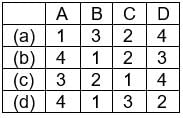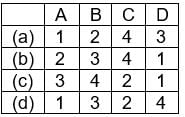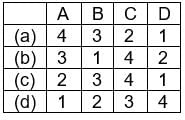Test: World Agriculture - 2 - UPSC MCQ
20 Questions MCQ Test - Test: World Agriculture - 2
Which one of the following countries has the largest arable land?
Which one of the following is not a type of shifting cultivation?
Which factor influences the plant growth most profoundly?
From which plant part is camphor (a distillate) obtained?
The part of Equatorial region which has well-developed rubber plantations is
Match List-I and List-II and select the correct answer from the codes given below;

Codes:

Arrange the following countries in the descending order of their wheat production and select the correct answer from the codes given below:
1. China
2. India
3. Russia
4. U.S.A.
Codes:
Which of the following is/are the chief characteristics of commercial grain farming of the middle latitude grasslands?
1. The size of farms are generally large.
2. Cultivation is highly mechanized.
3. It is a type of extensive farming.
Select the correct answer using the code given below:
Consider the following areas:
1. Central Africa
2. Borneo and Papua New Guinea
3. Amazon Basin
In which of the above areas is the primitive agriculture, such as shifting cultivation or bush-following type of cultivation, found?
Which one of the following matches in case of shifting cultivation is not correct?
Which among the following monoculture crops provide(s) immediate cash to the farmers?
1. Tea in Assam
2. Rubber in Africa
3. Sugarcane in Malaysia
4. Coffee in Brazil


















